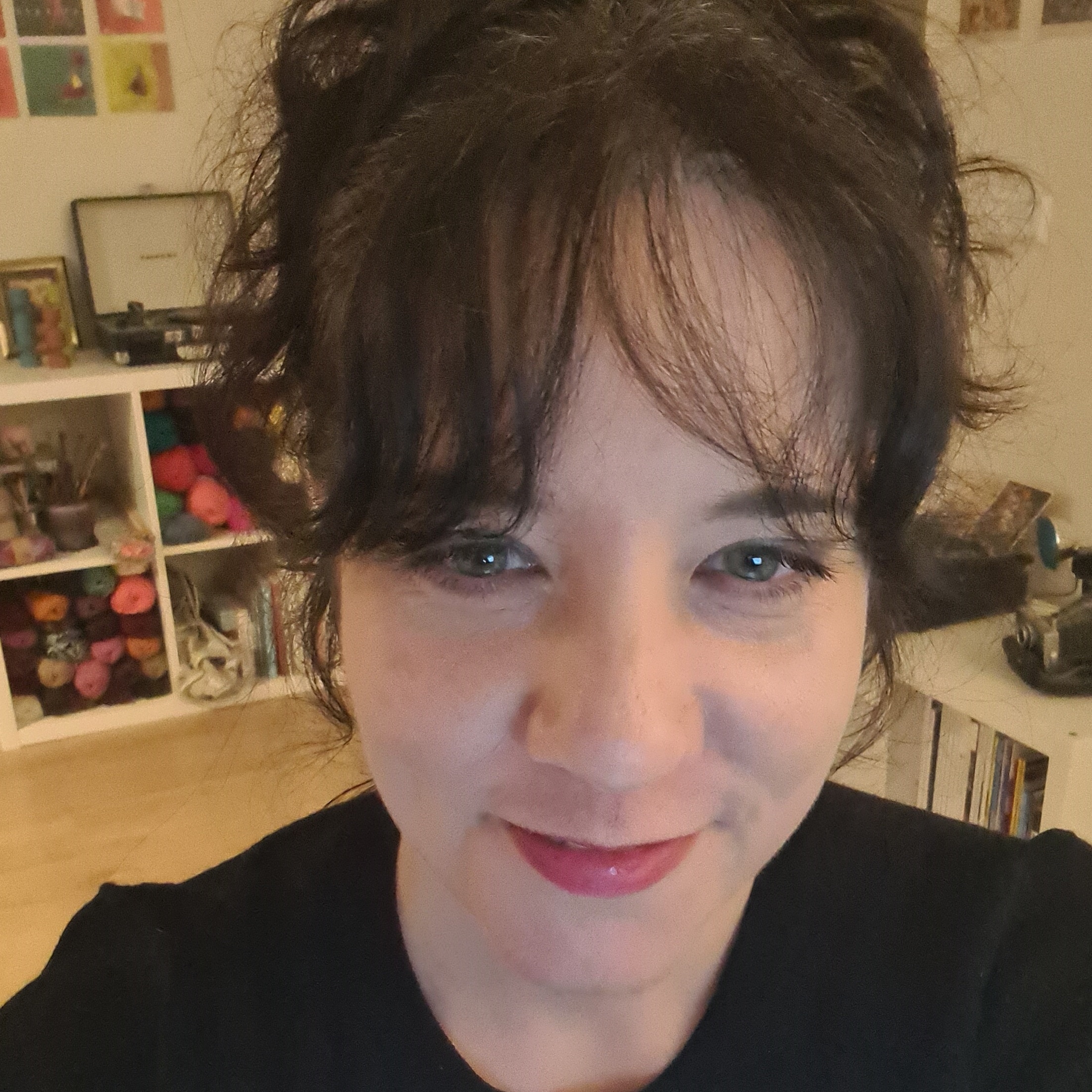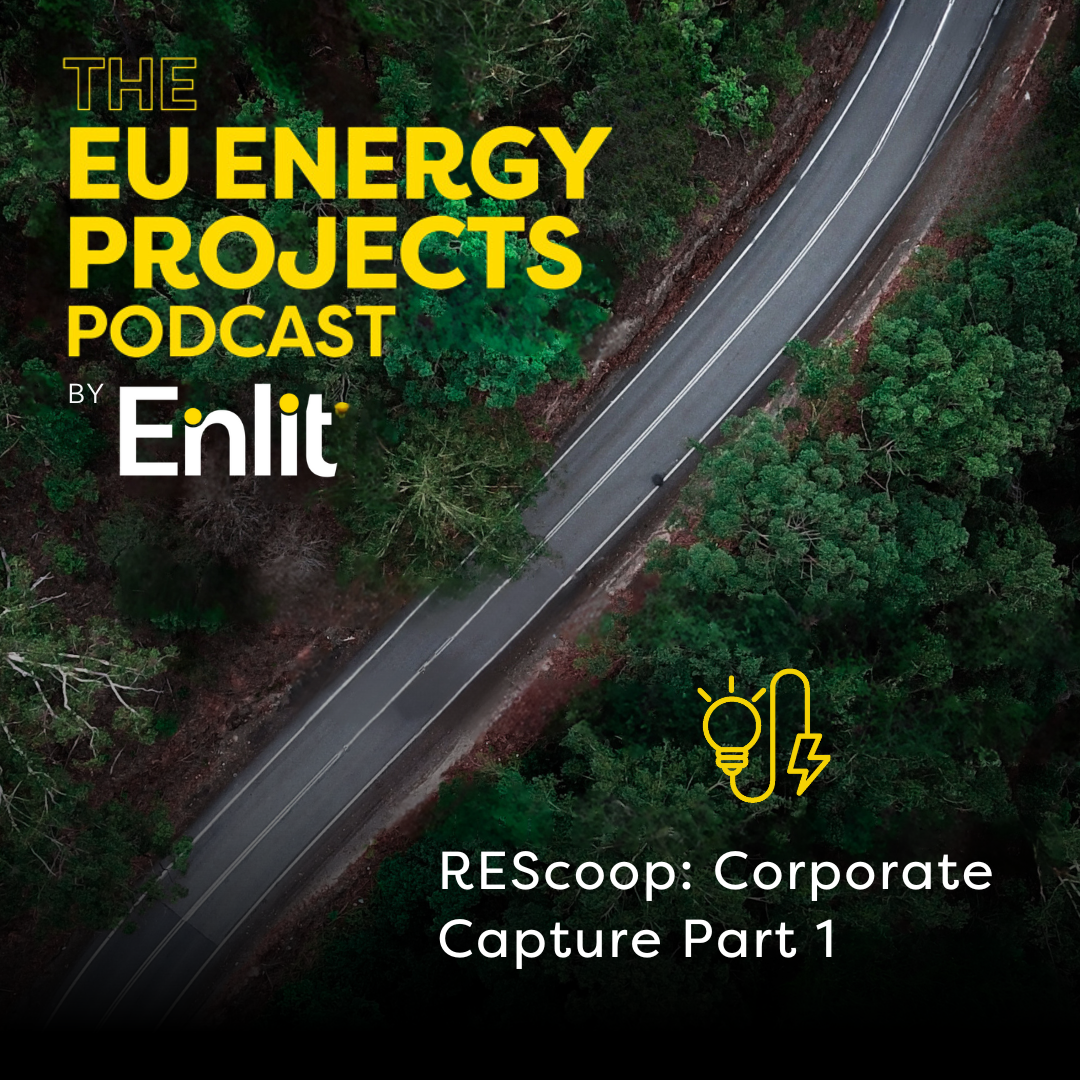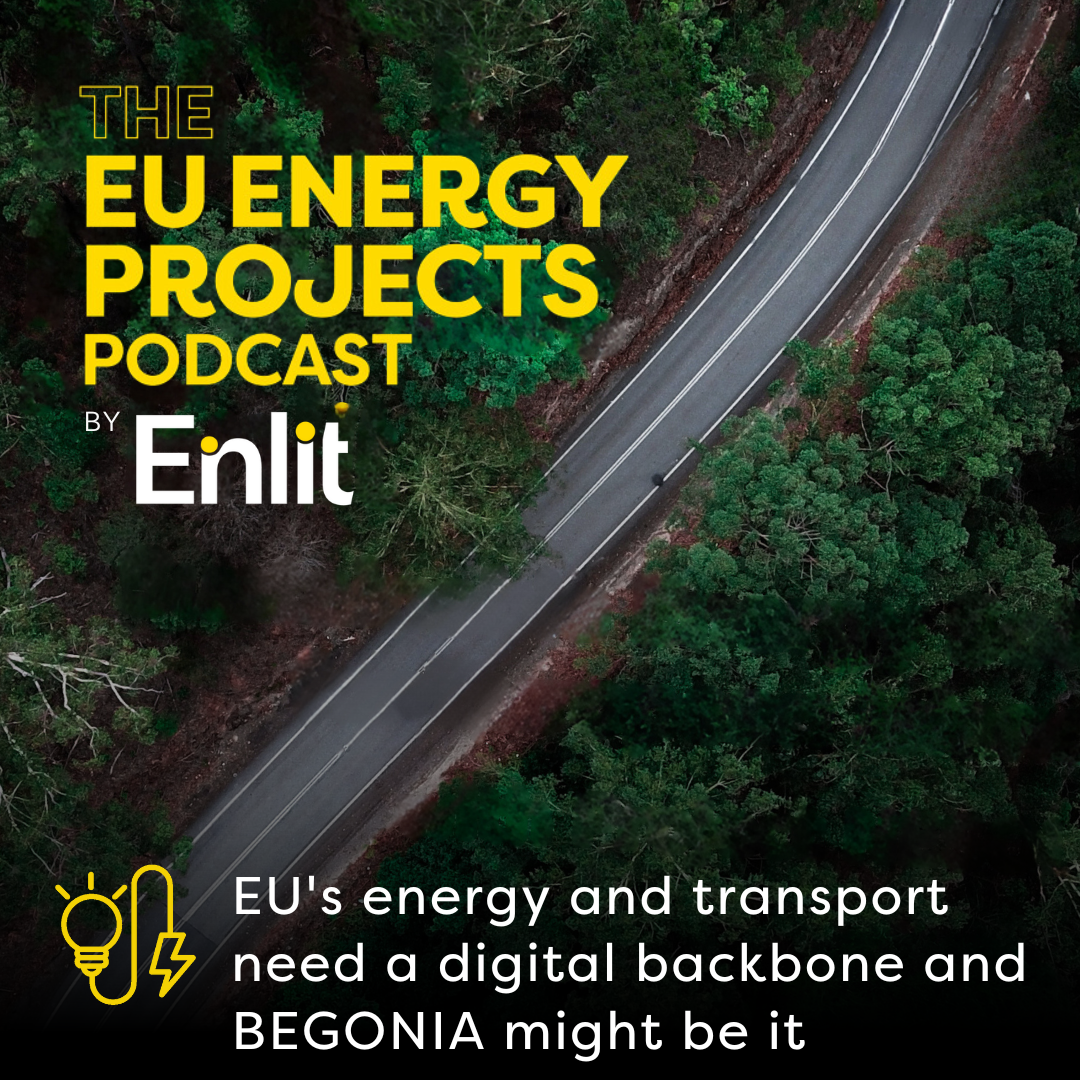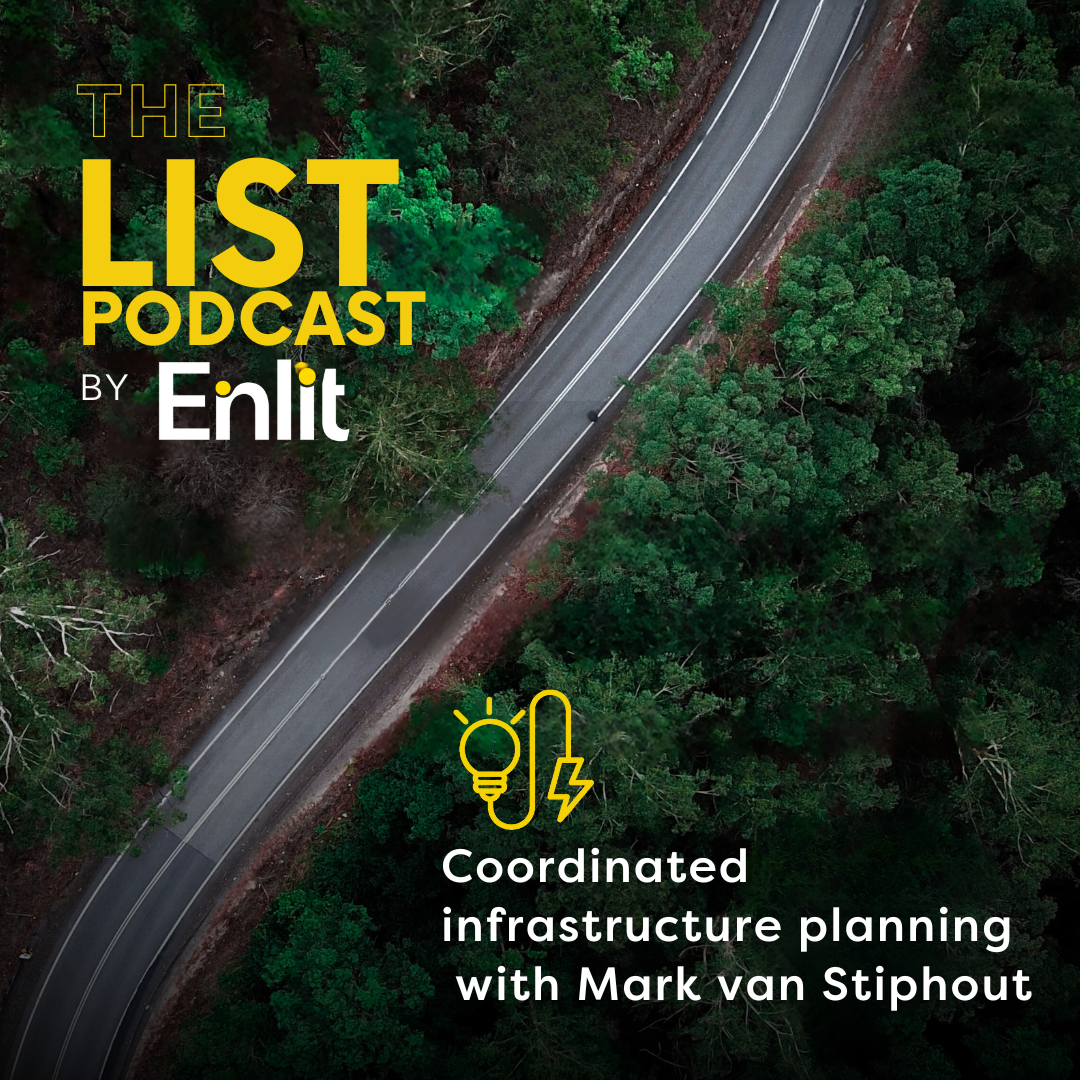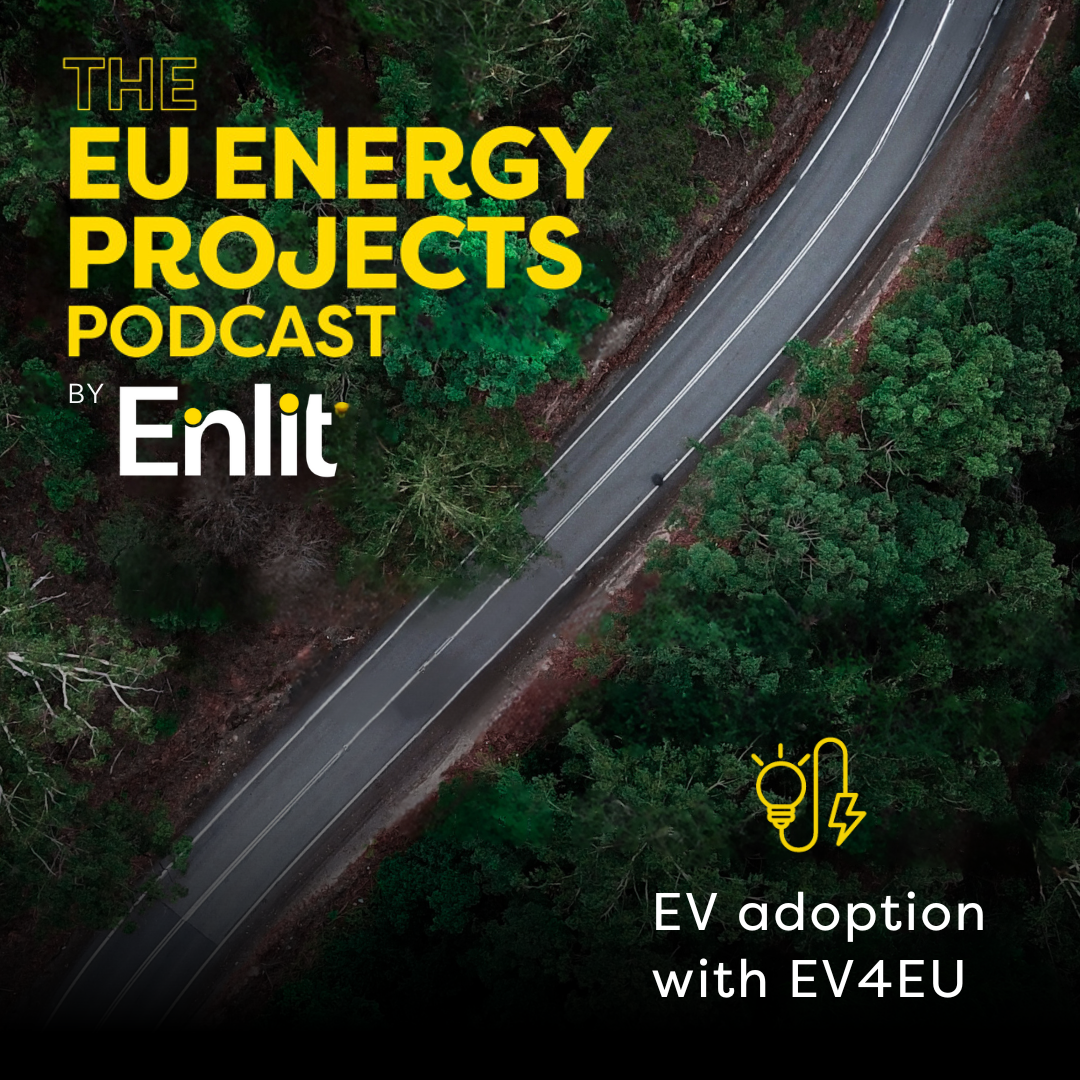Episode Transcript
[00:00:10] Speaker A: Welcome to the EU Energy Projects podcast, a podcast series from Enlighten France focusing on the clean energy transition for the European Union and the EU Commission funded energy projects that will help us achieve it. My name is Areti Daradimu. I am the editor of the EU Energy Projects podcast and your host.
During and late 2023, I had the opportunity to have a chat with Chris Vertos of risk.
He introduced me to the idea of corporate capture within energy communities. This is when large companies use their political power to take control of decision making, bending the rules, and displacing the rightful prosumers and members of energy communities.
In part one of our two episode series called Corporate Capture and true democracy in energy communities, Chris shares his insights.
[00:01:12] Speaker B: Chris, a few months ago, during European Sustainable Energy Week, I was discussing with a colleague of yours, Stanislas of resgroup, and he introduced me a little bit in more detail on the concept of corporate capture. Could you please elaborate a little bit, explain what it is and how risk group is seeing it?
[00:01:32] Speaker C: Yeah. So obviously, since 2019 that we've had the EU directives that are the clean energy package for all Europeans, that recognizes the right of citizens to participate in the energy transition. And we've had this exceptional boom in energy communities in almost all member states. You know, we're seeing really an exceptional growth since we've had the regulatory framework in place.
Obviously, this holds a lot of potential for citizens to democratize the energy transition. So from a theoretical standpoint, you see a niche, let's say an initiative, an idea that is starting to break ground into the mainstream.
And when a niche that holds revolutionary potential breaks into the mainstream, then usually the story goes that the forces of the status quo, of capitalism, of whatever you want to put it, they try to co opt it and try to take part in the game, let's say. So it's been the case that although energy communities are defined in the EU directives as being open, voluntary, multi stakeholder, let's say vehicles, initiatives that have to include citizens, they have to include municipalities, they have to include SME's.
It's really an open, multi stakeholder, as I said, vehicle. But the directives also stipulate that effective control and autonomy must remain with the citizens, which means that it has to be a democratically run initiative where citizens get to have a vote. They are the ones that have the last say in how the initiative is run.
What we're seeing in many cases is a company coming in and setting up a scheme where, let's say, a local collective self consumption project a set of solar panels on a school rooftop. And they're providing the energy as a service, as a market service to local citizens of the neighborhood.
And they are calling that an energy community.
It's not. It's not in the sense that it does not conform to the effective control and autonomy aspect, whereby each citizen of that project would have an equal share of. Well, a share in the project and an equal say in terms of the democratic governance. Every member would have one vote. Indeed, in such a case as the example that I gave, it's directly just owned by the company. They're the ones making the profit. It's a for profit entity as well. That's, I think, very important as well to highlight that as per the EU directives, energy communities are prioritizing social and environmental outcomes, not profit.
[00:04:05] Speaker B: But they do have profits. It is one of the prerogatives, one of the scopes, to have some profit in the end. Right. Even if it is to just sustain the community itself.
[00:04:15] Speaker C: Indeed. Exactly. And we are seeing very profitable and economically burgeoning energy communities. But that is, again, to highlight that as per digital directives, that shouldn't be the priority. It's that you create this initiative. Exactly. To pursue social and environmental outcomes. And of course, if in the meantime you also build a sustainable, economically sustainable business model, that's great, because you can have all three, but that's not the priority. And that's the really important thing where energy communities deviated, that they pursue a different decommodified energy system.
[00:04:47] Speaker B: And do you see corporates, for example, trying to obtain for themselves a piece of the pie? What kind of companies is it that they're trying to intervene?
[00:04:57] Speaker C: It's usually the big electricity and energy companies that are seeing this.
[00:05:02] Speaker B: Utilities.
[00:05:05] Speaker C: It can also be. It can also be. But it's. Yeah, exactly. Suppliers. It can be all sorts of electricity and energy companies.
And my problem with this is that by calling yourself an energy community, when you're clearly not, you are also opening up to benefits that should not accrue to you. Like for example, access to public EU funds, awareness, recognition, all these kind of things that they're doing, maybe as a tick box exercise for their esgs or to actually make some profit. But again, the control does not remain with the local citizens. It's nothing. A citizen driven project.
[00:05:40] Speaker B: No, it is. The way you describe it, it's almost as if the citizens are the vehicle for the corporate or the company to promote itself and gain.
[00:05:51] Speaker C: Exactly right.
[00:05:53] Speaker B: Does the EU know that, the EU commission?
[00:05:56] Speaker C: They do. They do. It's something that Azarez, Kobe as well. We've been highlighting, drawing from the examples of many different countries, Hungary, Spain, Greece, Poland. There's many different manifestations of corporate capture across different member states, and they are generally behind the scenes. A more pushing member states to tighten the screws in their respective regulatory frameworks to find the ways so as to prevent that from happening. Anyway, as I said, the directives themselves, they say that large companies cannot be part of energy communities, at least in renewable energy communities that is the case. So that already is a safeguard by the european legislation that says, okay, this is where we draw the line.
[00:06:39] Speaker B: Okay, so this is an example, let's say, or it shows that the european commission is trying to solve this issue. So let me give you an example to see if I understand correctly what an energy community is according to risk group and the commission, let's say, and what is happening there. So let's say that we have a sort of democracy in the form of ancient greek like demos, right?
And we have the citizens, which are the energy community members, voting for the representative of their choice. And instead you have someone coming from the outside and trying to usurp this situation like a tyrannos. Not in the way that we understand it now, but in the way that we understood it in ancient Greek. Grace. Sorry, is that, is that the case? More or less.
[00:07:33] Speaker C: Could be. Could be either. I think there's two scenarios. One, as I said, there's many manifestations of corporate capture, but just maybe, yeah, let's say, play along with your example. I would say that in this case, we would have someone coming and saying, look, I'll take care of it. You just sit back and you tend to your pleasures, you tend to your lives. And let me do the project, own it, I will pay for it. And you'll just be passive consumers. And in the other case, there is of course also cases where someone might come in, into an existing energy community and really, as you said, try to usurp, try to really take control by buying shares. So that's, again, it's difficult to narrow it down to one specific example.
But maybe since you're talking about Greece, I can perhaps elaborate a bit more on what's been happening there, because it's a country of 11 million and we have more than 1200 registered, the energy communities, which is more than all the other members they've combined, almost.
[00:08:36] Speaker B: It's impressive. I didn't know that it's impressive, but.
[00:08:38] Speaker C: It'S an inflated figure that doesn't actually represent reality. So what happened there was that we've had the regulatory framework in place since 2018, and that set a very small criterion for participation, which was you just needed five or 15 depending people to set up an energy community. And then there was also no central regulatory authority that was indeed monitoring how energy communities were working, how they were distributing their profits, their member composition. So in parallel to all of that, there was a very generous feed in tariff as well, for energy communities to sell energy. So this combination of these three factors, the loose regulatory framework and the generous remuneration for selling the electricity, created this extreme bubble of people creating huge, basically private investors, let's say three, four family members, a couple of corporations, corporate friends. They came together and they created a huge wind park, for example. And instead of indeed building, let's say, a ten megawatt wind park, they built ten individual energy communities next to each other. It's consisting of 1 mb wind turbine. So thereby they also got exempted from environmental impact assessments. So they really tried to find a loophole and abuse the system that way.
[00:09:56] Speaker B: Okay, then I take it back. It's not impressive. It's depressing, actually, for our country.
[00:10:04] Speaker A: Did you know that enlit has another podcast? The Energy Transitions podcast is a broad ranging bi weekly podcast about the people accelerating the energy transition in Europe and beyond. You can find it on Spotify, Apple, or wherever you enjoy your podcasts.
[00:10:24] Speaker B: What are the solutions that rescoop is proposing to fight this phenomenon? Because it is a phenomenon, sometimes the.
[00:10:32] Speaker C: Solutions are enshrined in the regulatory framework itself. Indeed, not to just debassing the greek framework. I can talk about some good examples that it has. One thing we want to see is effective control in terms of governance, whereby every member has one vote, regardless of how many shares they have. This is something that is important. But, for example, we see in the greek framework another thing that we propose, and we see happening in Lithuania, and more and more other countries are taking it up, like Ireland, Germany and so on. As I said, a monitoring agency, a public agency that actually monitors how these energy communities are working. They look at their member composition, they look at how they distribute the profits, they look at the kind of activities they do. So really, article by article, to make sure they're working in accordance with the law, they're open, voluntary, and so on.
Another thing that could be enshrined in legal frameworks is a limit to profits distribution. So that indeed, you set those safeguards and you say that an energy community can distribute up to, I don't know, 20% of dividends to its members, and then the rest can be channeled to social or environmental purposes in the local community or stay with the repository, the fund of the community itself that it can use to sustain itself. I would say this comes off the top of my mind at this point.
[00:11:57] Speaker B: I would like to mention that both Chris and myself were Greeks. So we are allowed to bash a little bit our country if we want to, because we do it with love.
Chris, I understand what you're saying, and in principle it makes sense. However, I would like to ask you, what about the energy community themselves and the people that are part of them that do not feel like being as active as perhaps you or risk group members? What about people that they just enjoy a plug and play situation? So in other words, there is this phenomenon of, let's say, usurping or trying to intervene, etcetera. But is it perhaps created due to the need? Is there a need also for it?
[00:12:46] Speaker C: That is a good question. I indeed will not create, let's say, yeah, super cherry loving situation where indeed everyone is super democratic and they participate in every assembly and so on. As you said, usually energy communities have concentric circles of membership, let's say participation. There's the core group, the affiliate group, the very loose people that are just following the development passively. So indeed, it would be false to say that every, every energy community and every citizen is willing to put in that daily effort of weekly effort, if you want, of participating in an energy community.
So there is a very large constellation of ways people can organize locally and consume energy locally, and that can sometimes actually be initiated by companies or can be initiated by third parties. But that shouldn't be called an energy community because that's how you start kind of defiling the spirit of the law. And then you actually start creating that misalignment in how funds or feeding tariffs or other incentives or, you know, priority access to the grid, how these are administered. Because if you have a vehicle, you know, an energy community that really wants to put in that work, it is citizen led, it is voluntary. It wants to deliver those social and environmental outcomes that should be rewarded and recognized by policymakers through these benefits that I just outlined. For example, now, if you're a big company and you just want to do a local project and provide the electricity as a service, do it. But don't expect that you're also going to get all the benefits from that. And generally, it is a position now, with the ongoing revision of the electricity market design, it is a position of rescue bu that we are against third party ownership of local projects. So basically having a big company owning the project and then leasing it, selling the energy to local people, we think that local collective cell consumption or energy sharing projects should be initiated and owned by citizens.
[00:14:48] Speaker B: So it's not just a matter of semantics. You want a different title for, let's say, the company led communities, but not because you just want a different title. It has a meaning. Also, it will have, or let me put it this way, they will function under different rules, regulations, and they will have different kind of benefits.
So you did mention some rescue projects. Do you have something particular that you can share with us that gives a good example of an energy community?
[00:15:32] Speaker C: So one thing that I've been working on with address for almost a year now is a public financing tracker project. Basically we've been mapping to what extent member states across the EU are using the recovery and resilience facility, their cohesion funding and their modernization funds to support energy communities. We've created this interactive, color coded map that people can explore and compare how different member states are doing. It's been a quite useful advocacy tool. We approach policymakers and we say, this is what Spain is doing. Why are you not doing this? This is what Malta is not doing, what they could be doing. And most importantly, the key message from that project has consistently been that public funds should be used to support energy communities, but we should be very careful to direct them to genuine energy communities. Because you don't want, at the end of the day, to provide state Aidan to provide indirect support to a big energy company. You want to provide feasibility, pre development development assistance to citizen led communities that have a genuine social impact. There was a very interesting call by the Lazio region in Italy from the regional development fund, the European Regional Development Fund, ERDF. And basically it was directed to energy communities. And there were points in the tender that were given if the energy communities had single parent households in them, if they had energy poor households in the community, if the projects that they were initiating were about local self consumption. So really meeting local energy demand. So that way the public authorities set the bar high. They say that this is the energy communities that we should be supporting in terms of an energy community. I can maybe tell you mine from Greece, I mean, the board of directors as well. So we are a group of about 120 citizens. There's a couple of SME's, there's a dry cleaners, there's a couple in Athens. Yeah, it's in Athens.
[00:17:27] Speaker B: Oh, then maybe I can join also, of course.
[00:17:29] Speaker C: I thought you lived in the Netherlands.
[00:17:31] Speaker B: I live in the Netherlands, but I have a house in Athens also.
[00:17:34] Speaker C: Ah, perfect. Okay.
And basically what we're currently doing is we're just finishing the construction of a 500 kilowatt solar park, which is outside of Athens.
And what's gonna happen there is we're going to utilize the virtual net metering model, where all the energy that is produced on site is fed into the grid, and it's metered with all the consumptions of the various members across Athens.
And it's quite interesting. We now have a working group on advocacy, on energy poverty, on new technologies, on all sorts of things. That is what's very exciting about energy communities. Not only do they propose a beyond profit, let's say, decommodified view of energy, they're also living organisms that evolve. They sit down and they educate, they do other projects. They don't just sit and do one solar park to sell energy. They're in a constantly evolving organism.
[00:18:29] Speaker B: What about funding away from the EU commission? I mean, from what we have discussed and from what I know, it's basically energy communities get their funding from the EU commission, may be discussed as a local authority subsidy or whatever, but it is the commission in the end. Do we have anything else? How else can we fund these things?
[00:18:52] Speaker C: Yeah, maybe just to very quickly respond to the EU Commission. Well, it's technically, one part is EU funds. Indeed, like we said, like the RRF ERDF, one part is an important part. For example, in countries like Germany or Ireland is national funds.
[00:19:12] Speaker B: Yes, but that is in countries that can actually afford it. What about the countries of the European south that cannot really afford something like that?
[00:19:20] Speaker C: Cases, we have self financing of projects by the members themselves. There are cases where an energy community is big enough, like some energia in Spain, or eco power in Belgium, where the energy community has grown large enough, they have more than 60,000 members, that they have a portfolio of projects, prove they can go to a bank and say, look, we are a trustworthy, bankable organization. Give us a loan. So there's always loans. And of course, there's ethical and cooperative banks as well that can give these loans at much more favorable terms because they understand the added value of energy communities. There is some interesting more, let's say, bottom up initiatives of crowd investment, where basically we see this happening in Croatia, we see this happening in Portugal, in Greece, there is a mediating platform where citizens from all over Europe can put some money like a micro medium loan, let's say €50, €500, €1000, which goes to the community, and then of course, they get their money back with interest, but we're not. So it is, let's say investment, but it's not equity. They don't own a part of the construction, they just sign an agreement to get their money back with interest. So there is also that model as well, that's been kind of promoting an inter cooperative solidarity model across Europe, where one community can help fund another community, but still get their money back.
[00:20:42] Speaker B: Would you be open, and by you, I mean with your capacity as risk group, let's say representative, but also representative of the energy community, be open to private funding as long as that private funding doesn't try to, let's say, your power.
[00:20:59] Speaker C: Exactly. As long as the autonomy and the effective control stays with the actual energy community. And at the end of the day, it's still led by its members, then yes, we think that the flow of capital into community energy projects, into projects that democratize the energy transition, we are open to that, we are welcoming to that. And of course, other forms of assistance as well, technical assistance, other sorts of services that energy communities can enjoy as players in the energy market. But indeed, as you said, we have to always be mindful of the power dynamics of really not letting the market co opt us. Because energy communities are becoming a very big thing. Everyone is talking about it. Suddenly, when everyone starts talking about something, you always have to remain vigilante. And ultimately, where does the power lie? Who gets the final call in the funding, who gets the final call in the governance? You have to adopt, let's say a more. You're from the Netherlands. There's a big theoretical, let's say, academic discussion there about power and social innovation and all of that. We have to be mindful of these things.
[00:22:03] Speaker B: I'm from Greece.
[00:22:05] Speaker C: I meant you live in the Netherlands. Yeah, yeah, I know.
[00:22:08] Speaker B: Just nicely with you now a little bit.
What are the next steps? What is in your agenda for 2024? Again, when I say your agenda, I mean rescoup and your corporation.
So your energy community.
[00:22:23] Speaker C: Yes, well, I'll start with this one for the energy community. We are, as I said, just finalizing the project. So we'll be expecting within 2024 to see all our members enjoy next to zero electricity bills, which is going to be a very big milestone. With rescoup, we have broad portfolio projects, but we are very much interested in continuing the work with public funds and really starting to get to the nitty gritty of coaching energy communities of how to access these funds, because they might be there. But that doesn't necessarily mean that energy communities know about them.
We're looking at new business models as well. We're looking at a lot of citizen led renovations. So going beyond just energy production and self consumption, we're starting to look at other ways that citizens can get involved in the energy transition. You have some very good examples of this. Like in Ireland, the energy communities Tiperelli cooperative. It's a local cooperative that helps citizens access all stages of the renovation process for their homes, including accessing grants from the irish government. And because it's a cooperative, it works in a not for profit way. It wants to help the local community. So again, you know, you see that aspect there.
What else? We're working a lot with energy poverty, and especially now, I think with the past year and a half, with the energy crisis, it has become more and more evident how we need to tap into that, say, decommodifying potential of energy communities to shift towards a more fair energy system where everyone has unfettered access to local clean energy. That's quite important to stress, let's say, the general directions.
[00:24:03] Speaker B: Perfect.
[00:24:04] Speaker C: Maybe I can actually just bring one practical example to what I said in the end. So, speaking about this potential of energy decommodification, moving beyond profit and really pursuing other goals like tackling energy poverty, I think we really need to look at what happened during the 2022, 2023 period.
The big bust of the energy crisis, where prices were back that August when 1 was costing, I don't know, €220.
[00:24:32] Speaker B: You mean after the Ukraine?
[00:24:34] Speaker C: Exactly, exactly. We have to look at this very famous example of eco power. I mentioned it before, it's the largest energy cooperative in Europe, and the largest one in Belgium as well. And it's a producer, but it's also a supplier of energy. And they created this graph that visualizes the price of electricity of all conventional, let's say, suppliers, for profit suppliers in the belgian electricity market. And it also shows their electricity price throughout that year of the energy crisis. And it is staggering how much lower the prices of ecopower were. Exactly. Because their goal was not to squeeze out as much profit as possible from their members and consumers as for profit suppliers tend to do.
They gave as cheap as possible their locally produced renewable energy electricity to their members to tackle energy poverty, to give access to clean energy. So really, that goes to show the two different worldviews, the two different approaches to this energy, social and economic transformation.
[00:25:41] Speaker A: Thanks for joining Chris and sharing your insights. In our next episode, we'll hear from two more members of risk from the energizamen, the Dutch Federation of Energy Cooperatives as we unpack hurdles in EU policy making and what democracy truly means in energy communities.
You've been listening to the EU Energy Projects podcast, a podcast brought to you by enlightenment. You can find us on Spotify, Apple, and the enlit world website. Just hit subscribe and you can access our other episodes too. I'm aretitaradimo. Thank you for joining us.
